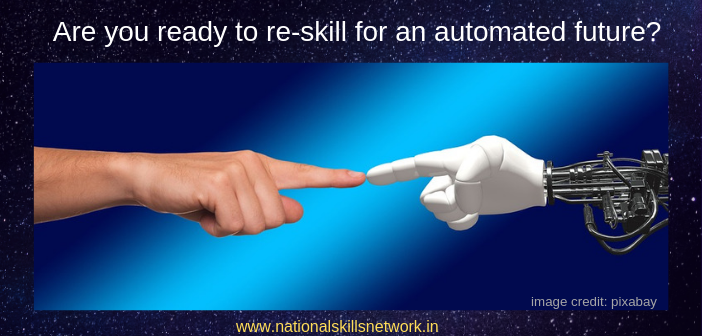Are you ready to face the growing impact of automation at workplace? As automation becomes increasingly adopted in all industries, this question continues to be top of mind for all employers who want to maintain a skilled workforce. As industries integrate automation with the changing technology, new jobs are being created which demands employees to get skilled, reskilled and upskilled.
You would have experienced the impact of automation in all industries. For example, service industries like Retail are automating their work processes to provide an enriching experience to the customers. Right from parking a car without buying a ticket to get acquainted with the cashier-less stores, the shopping experience of people have changed to a different level. Since, there is a surge of customer-driven focus, it is imperative for companies to bring in innovation on a faster pace.
In this context, irrespective of the industry-type, its very important for you to improve the skill levels of your workforce so as to make them competent. This way, you can create a collaborative environment where the skills of humans and robots will together contribute to the business growth.
 The benefits of reskilling your workforce are plenty. Employees who constantly evolve their skill sets are able to take advantage of the latest technologies. That translates to better productivity and innovation. To create and retain a skilled workforce to meet the demands of future, you should take 3 approaches.
The benefits of reskilling your workforce are plenty. Employees who constantly evolve their skill sets are able to take advantage of the latest technologies. That translates to better productivity and innovation. To create and retain a skilled workforce to meet the demands of future, you should take 3 approaches.
3 approaches for re-skilling the workforce
Meeting industry-demands
As you know, the future of work is not yet known completely. Most of the employees may have started their jobs with only one specialised skill or would have acquired few over the years. A decade ago, these skills were enough for them to perform and deliver as per the job. However, the future calls for multi-skilled employees who are relevant with their domain, technology and soft skills. You should invest in providing industry-relevant training to your employees to make them accustomed with the industry-demand. This can be done through industry academia collaborations. The more employees are exposed to advanced technological standards, the more they will align themselves with the changing processes.
Creating a learning path
As an employer, you must invest in employees who are willing to learn and adopt change. As against the common approach of providing a career path, it’s high time we realize the importance of a learning path. New learning is not just about having a number of certifications, it is about creating a path where employees are aware of their current skill sets and future skills that are in need. You should understand the skill level of employees and advise them of the relevant opportunities that can be utilized based on their level. Once, employees are aware of the skill-demand, they will be able to shape their career in the right way through relevant learnings, upskilling, reskilling etc.
Motivation for life-long learning
Accept the fact that work and learning go together – and not all will do it, so they need to be motivated and also incentivized. Coping up with the ever changing technological processes will be a bit difficult for some individuals. Life-long learning is essential to keep abreast with the changing era. Work-based learning and participation can push employees’ learning momentum and encourage them to perform more. Peer-group involvement and employee-employer interactions can influence the way in which employees approach the life-long learning process. Extrinsic and external incentives like cash rewards, bonuses, employer recognition etc will motivate employees to maximise their learning capability. Organising collaborative motivational programs and speech, connecting with inspirational mentors, creating an opportunity for social learning etc will create a positive environment where employees would be able to understand and analyse the need for life-long learning in a better way.
As you know, employees will have different views on the changing workplaces. To make the most of automation in workplaces, different skills are essential for employees. Lifelong learning should be part of the work environment and you need to invest highly in human capital. Rretraining, reskilling, and empowering employees for the future is the key to integrating automation. To update them with relevant skills, you should create an open learning environment where they can work collaboratively. This makes them feel motivated and appreciated and they tend to adopt new strategies to increase the workplace coherence. As such, you can utilize your workforce in the right way to meet the demands of an automated future!
Let us know your initiatives in re-skilling your employees. We would be happy to hear from you. Write to us at: contact@nationalskillsnetwork.com














I want to job